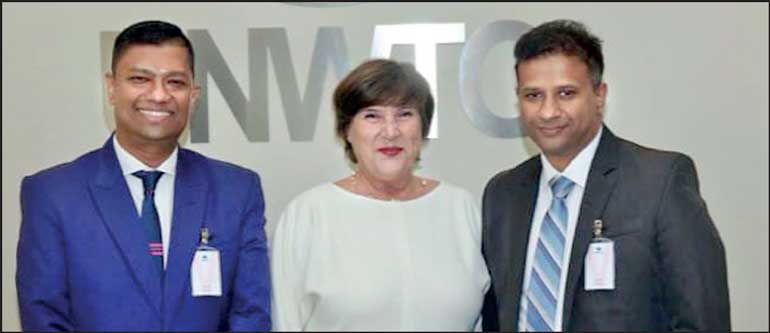Friday Feb 20, 2026
Friday Feb 20, 2026
Friday, 26 January 2024 00:22 - - {{hitsCtrl.values.hits}}

From left: SLTPB Chairman and UNWTO Committee on Tourism and Competitiveness Vice-Chair Chalaka Gajabahu, UNWTO Executive Director Zoritsa Urosevic and SLTPB Assistant Director – France and Spain Viranda Bandara
Sri Lanka Tourism Promotion Bureau (SLTPB) Chairman Chalaka Gajabahu was recently elected Vice Chair of the United Nations World Tourism Organisation (UNWTO) Committee on Tourism and Competitiveness (CTC).
The Committee is one of the technical committees of the UNWTO and a subsidiary organ of the Executive Council. The Committee was established at the 95th session of the Executive Council in Belgrade, Serbia in May 2013. The Executive Council approved the rules of procedure and composition during its 96th session held in Victoria Falls, Zimbabwe, in August 2013.
Since its establishment in 2013, CTC focused mainly on assessing the state of knowledge on the basic concept of ‘tourism competitiveness’ and identifying its key factors. This process has also included identifying, developing and harmonising concepts, models and operational definitions used in the tourism value chain.
“I am delighted to have been elected Vice Chair of the CTC under the UNWTO and support the role in the best way possible. In my capacity as SLTPB Chairman under the aegis of Tourism Minister Harin Fernando, I understand the importance of fine-tuning a dialogue mechanism between the public sector and the private sector to improve tourism competitiveness. This opportunity will undoubtedly give me a platform to develop and enhance the competitiveness landscape which is a vital tool in tourism development globally,” Gajabahu said.
The UNWTO emphasises building synergies and strategic alignments in the harmonisation of the related activities of the Secretariat as well as other collaborating organisations and entities to ensure consistency and consensus in the delivery of the outputs and reinforce the official position of the organisation.
It is crucial to establish a shared understanding of operational definitions used throughout the tourism value chain to offer UNWTO members and other stakeholders in the tourism sector a coherent, concise, and globally applicable conceptual framework. It involves incorporating both quantitative and qualitative factors that elucidate competitiveness at the destination level. These factors can then be translated into technical guidelines, providing destinations with a methodology to identify and assess their competitive elements.